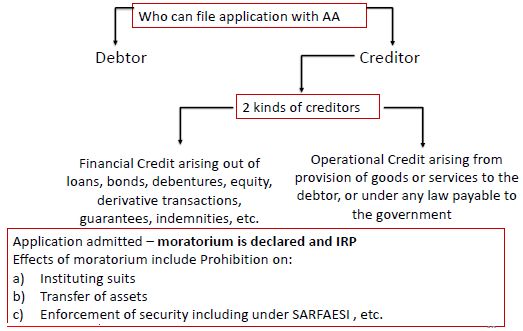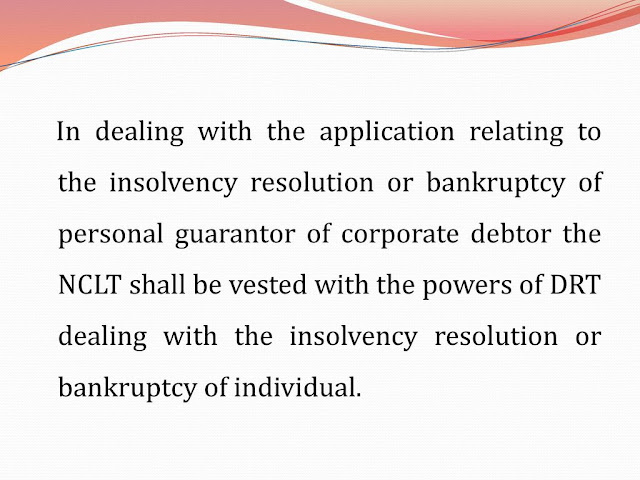A FINANCIAL CREDITOR CANNOT INITIATE ACTION
UNDER SARFAESI Act, 2002 WHEN A MOROTORIUM WAS ISSUED AGAINST A CORPORATE
GUARANTOR UNDER SECTION 14 OF IBC Code 2016.
NATIONAL COMPANY LAW APPELLATE TRIBUNAL, CHENNAI HELD IN
STATE BANK OF INDIA
Vs.
M/s. VEESONS ENERGY SYSTEMS PVT. LTD
FACTS OF THE CASE
Mr. V. Ramakrishnan
(1st Respondent), Director of M/s. Veesons Energy Systems Pvt. Ltd. (“Corporate
Debtor”) given personal guarantee and mortgagor of collateral securities of his
assets with the Appellant State Bank of India (“Financial Creditor”) against
the facilities availed by the ‘Corporate Debtor’. In view of the personal
Guarantee given by Mr. V. Ramakrishnan (1st Respondent), he comes within the
meaning of ‘Personal Guarantor’ as defined under sub-section (22) of Section 5
of the Insolvency and Bankruptcy Code, 2016 (hereinafter referred to as
“I&B Code”).
ACTION
AGAINST PERSONAL GUARANTOR BY
STATE BANK OF INDIA- FINANCIAL CREDITOR
The State Bank of India (“Financial Creditor”)
invoked its right under Securitisation and Reconstruction of Financial Assets
and Enforcement of Security Interest Act, 2002, (hereinafter referred to as
“SARFAESI Act, 2002”) against the ‘Personal Guarantor’ under Section 13(2) on
4th August, 2015 for recovery of Rs. 61,13,28,785.48/- from the said 1st
Respondent as securities. The notice was challenged by the ‘Corporate Debtor’
before the Hon’ble High Court of Madras, which was dismissed with costs on 17th
November, 2016. Thereafter, the State Bank of India (‘Financial Creditor’)
issued a Possession Notice dated 18th November, 2016 under Section 13(4) of the
SARFAESI Act, 2002 and taken symbolic possession of the secured assets.
INITIATION OF CIRP UNDDER SECTION 10 OF THE ‘
I&B CODE’ 2O16
BY CORPORATE DEBTOR.
Having failed to get
relief from Hon’ble High Court of Madras, the ‘Corporate Debtor’ invoked
Section 10 of the ‘I&B Code’ which was admitted, order of ‘Moratorium’ was
passed and an ‘Interim Resolution Professional’ was appointed. 4. Even after
declaration of the ‘Moratorium’, the Appellant- State Bank of India (‘Financial
Creditor’) continued to take measure under SARFAESI Act, 2002 and proceeded
against the property of the ‘Personal Guarantor’ (1st Respondent) and issued
Sale Notice on 12th July, 2017.
SECTION 140 OF THE INDIAN CONTRACT ACT
In view of the
provisions of ‘I&B Code’, Section 140 of the Indian Contract Act, 1872 and
the decision of the Hon’ble High Court of Madras, the Adjudicating Authority
allowed the Interlocutory Application preferred by the ‘Personal Guarantor’,
and restrained the Appellant- State Bank of India (‘Financial Creditor’) from
proceeding against the ‘Personal Guarantor’ till the period of ‘Moratorium’ is
over.
WHETHER MORATORIUM IS APPLICABLE TO
PERSONAL GUARANTEE?
Learned counsel for
the Appellant submits that the order of ‘Moratorium’ will not affect the assets
of the ‘Personal Guarantor’. On the other hand, according to counsel for the
Respondents, in view of subsection (1)(b) of Section 14 and sub-section (1) of
Section 31 of the ‘I&B Code’, the Appellant- State Bank of India
(‘Financial Creditor’) cannot proceed even against the ‘Personal Guarantor’.
DECISION
NCLAT held that on
bare perusal of the aforesaid provisions, it is clear that not only institution
of suits or continuation of pending suits or proceedings against the ‘Corporate
Debtor’ are prohibited from proceedings, in terms of clause (b) of sub-section
(1) of Section 14 of the ‘I&B Code’, transfer, encumbrance, alienation or
disposal of any of its assets of the ‘Corporate Debtor’ and/ or any legal right
or beneficial interest therein are prohibited. Clauses (c) & (d) of
sub-section (1) of Section 14 of the ‘I&B Code’ prohibits recovery or
enforcement of any security interest created by the corporate debtor in respect
of its property including the property occupied by it or in the possession of
the ‘Corporate Debtor.
APPLICABILITY OF MORATORIUM TO GUARANTOR
In view of the
aforesaid provisions, NCLAT , Chennai that the ‘Moratorium’ will not only be
applicable to the property of the ‘Corporate Debtor’ but also on the ‘Personal
Guarantor’.



No comments:
Post a Comment